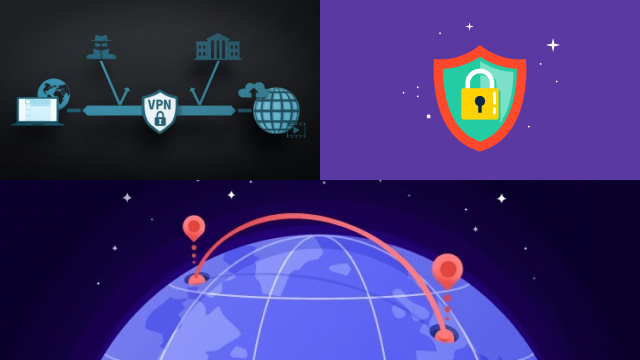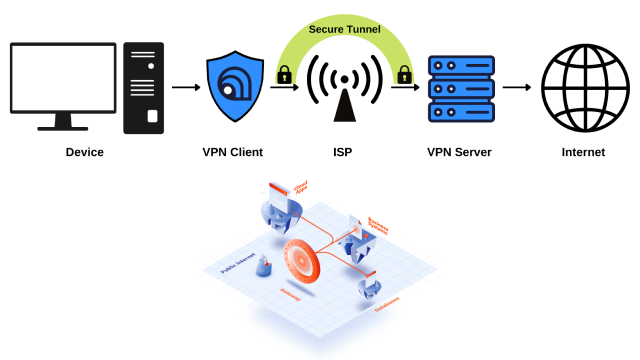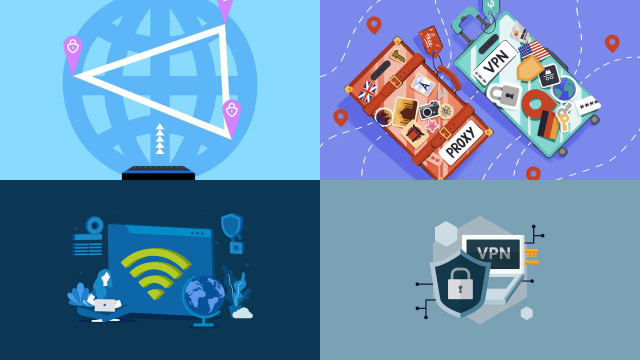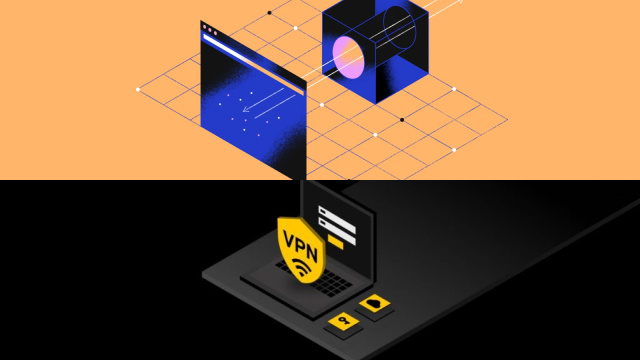Understanding VPNs: A Simple Explanation
A VPN, or virtual private network, is a technology that allows you to securely connect to the internet. When you use a VPN, your internet traffic is routed through an encrypted tunnel, which protects your online activity from prying eyes. This can be especially useful if you’re using a public Wi-Fi network, as it makes it much more difficult for hackers or other malicious actors to intercept your data.
In addition to protecting your privacy, VPNs can also be used to bypass certain internet restrictions. For example, if you’re traveling in a country where certain websites or services are blocked, you can use a VPN to connect to a server in a different location and access the content you need.
There are many different VPN providers available, each with their own features and pricing models. However, the basic idea behind all VPNs is the same: to provide a secure and private connection to the internet. Whether you’re looking to protect your personal information or access geo-restricted content, a VPN can be a valuable tool to have in your online arsenal.
How VPNs Work: The Technical Details
A VPN, or Virtual Private Network, is a technology that allows users to connect to the internet securely and privately. When you connect to a VPN, your device establishes an encrypted tunnel to a remote server operated by the VPN provider. All data sent and received over this connection is encrypted, which makes it extremely difficult for anyone to intercept or spy on your online activity.
VPNs are commonly used to protect online privacy, but they can also be used for other purposes. For example, some people use VPNs to bypass geo-restrictions and access websites or online services that may be blocked in their location. Others use VPNs to avoid online censorship or to access content that may not be available in their country.
Overall, VPNs provide a simple and effective way to protect your online privacy and security. While there are many different VPN providers available, the basic concept of a VPN remains the same: to create a private and secure connection between your device and the internet.
The Benefits of Using a VPN
Using a VPN, or Virtual Private Network, offers a number of benefits for users. One of the primary benefits is enhanced privacy and security. When you connect to a VPN, all of your internet traffic is encrypted, which means that no one can spy on your online activity or steal your personal information.
Another benefit of using a VPN is the ability to bypass online restrictions and censorship. Some websites or online services may be blocked in certain locations, but by connecting to a VPN server in a different location, you can access these resources as if you were physically located there.
VPNs can also be useful for protecting your data when using public Wi-Fi networks, which are often insecure and vulnerable to hacking. With a VPN, your internet traffic is encrypted, which makes it much more difficult for hackers to intercept your data and steal sensitive information such as passwords or credit card numbers.
Overall, using a VPN can help to enhance your online privacy and security, while also providing access to a wider range of online resources. Whether you’re using a VPN for personal or business purposes, it’s a simple and effective way to protect your online activity and keep your data safe.
Privacy Protection: How a VPN Keeps Your Data Safe
One of the primary benefits of using a VPN, or Virtual Private Network, is enhanced privacy protection. When you connect to a VPN, your internet traffic is encrypted, which means that no one can see what you’re doing online or steal your personal data.
VPNs work by routing your internet traffic through a remote server operated by the VPN provider. This server acts as an intermediary between your device and the internet, encrypting all data sent and received over the connection. This means that even if someone were to intercept your data, they wouldn’t be able to read it because it’s encrypted.
In addition to encrypting your internet traffic, many VPNs also offer other privacy protection features such as a no-logs policy, which means that they don’t store any information about your online activity. This can help to protect your privacy even further and ensure that your data is kept safe.
Overall, using a VPN is an effective way to protect your privacy and keep your data safe from prying eyes. By encrypting your internet traffic and offering other privacy protection features, VPNs provide a simple and effective way to enhance your online security.
Bypassing Censorship and Geo-Restrictions with a VPN
One of the key benefits of using a VPN, or Virtual Private Network, is the ability to bypass censorship and geo-restrictions. Many countries and organizations impose internet restrictions that limit access to certain websites, content, and services. However, by using a VPN, you can connect to a server located in a different country and access the internet as if you were located there.
For example, if you’re in a country that blocks access to social media platforms such as Facebook or Twitter, you can use a VPN to connect to a server located in a different country where these websites are accessible. Similarly, if you’re trying to access a streaming service that’s only available in certain countries, you can use a VPN to connect to a server located in that country and access the service.
Overall, using a VPN can be a powerful tool for bypassing censorship and geo-restrictions. By connecting to a remote server, you can access the internet as if you were located in a different country, giving you access to a wider range of content and services.
Choosing the Right VPN Provider: Factors to Consider
Choosing the right VPN provider can be a daunting task, as there are many different options available. When evaluating VPN providers, there are several factors to consider to ensure that you choose the right one for your needs.
One of the most important factors to consider is the level of security offered by the VPN provider. Look for a provider that offers strong encryption protocols and has a no-logs policy, which means they don’t keep any records of your online activity.
Another important factor to consider is the number and location of servers offered by the provider. The more servers available, the better the chances of finding a fast and reliable connection. Additionally, if you’re looking to bypass geo-restrictions, make sure the provider has servers located in the countries you need access to.
Other factors to consider include the price of the service, the ease of use of the VPN client, and the level of customer support offered by the provider.
Overall, choosing the right VPN provider requires careful consideration of several factors. By taking the time to evaluate your options, you can ensure that you choose a provider that meets your needs and provides the level of security and privacy you require.
Setting Up and Using a VPN: A Step-by-Step Guide
Setting up and using a VPN, or Virtual Private Network, can seem intimidating at first, but it’s actually a straightforward process. Here is a step-by-step guide to help you get started:
- Choose a VPN provider that meets your needs and sign up for a subscription.
- Download and install the VPN client on your device.
- Open the VPN client and log in using your account credentials.
- Select a server location from the list provided by the VPN client.
- Click on the “Connect” button to establish a VPN connection.
- Once connected, all internet traffic on your device will be routed through the VPN server, encrypting your data and providing enhanced privacy and security.
- When you’re finished using the VPN, simply disconnect from the server using the VPN client.
Overall, setting up and using a VPN is a simple and effective way to protect your online privacy and security. By following these steps, you can quickly and easily establish a secure connection to a remote server and enjoy the benefits of a VPN.
Common VPN Myths Debunked
There are many myths and misconceptions about VPNs, or Virtual Private Networks, that can make it difficult to understand their true benefits and capabilities. Here are some common VPN myths debunked:
- Myth: VPNs are only for tech-savvy individuals. Reality: While VPNs do require some technical knowledge to set up, many VPN providers offer user-friendly interfaces and straightforward setup guides.
- Myth: VPNs are illegal. Reality: VPNs are legal in most countries, although there are some exceptions. It’s important to check the laws in your country to ensure that using a VPN is legal.
- Myth: VPNs slow down internet speeds. Reality: While using a VPN can result in a slight decrease in internet speed due to the encryption process, many modern VPNs use advanced technology to minimize this impact.
- Myth: VPNs are only useful for accessing restricted content. Reality: While VPNs are commonly used to bypass geo-restrictions and access restricted content, they also provide enhanced privacy and security for all online activities.
By debunking these common VPN myths, we can better understand the true benefits and capabilities of VPNs and make informed decisions about using them for online privacy and security.
Conclusion: Why You Should Start Using a VPN Today
In today’s digital age, online privacy and security are more important than ever. Using a VPN, or Virtual Private Network, is an effective way to protect your online activity from prying eyes and potential security threats.
By encrypting your internet traffic and routing it through a remote server, a VPN can provide enhanced privacy, security, and anonymity while browsing the internet. Additionally, a VPN can allow you to bypass censorship and geo-restrictions, access restricted content, and protect your sensitive data from hackers and other online threats.
While some may be hesitant to start using a VPN due to perceived complexity or cost, the benefits far outweigh any potential drawbacks. With many user-friendly VPN providers available at affordable prices, there’s never been a better time to start using a VPN to protect your online activity.
In conclusion, if you value your online privacy and security, you should consider using a VPN today. By taking this simple step, you can ensure that your internet activity remains private and secure, and enjoy the many benefits that a VPN can provide.




